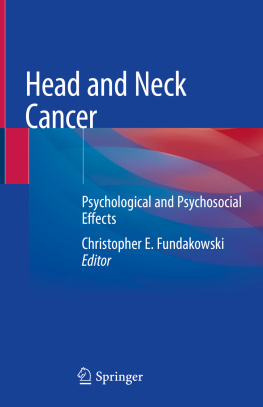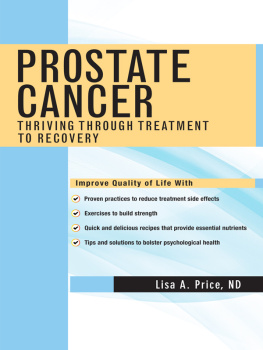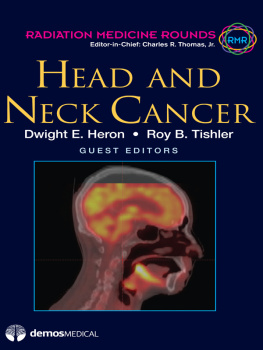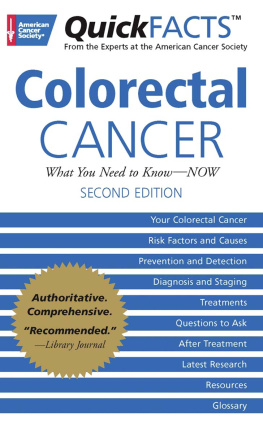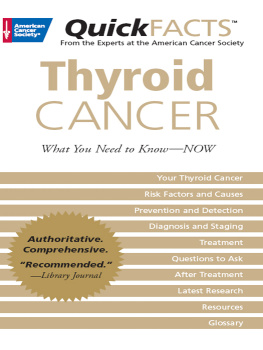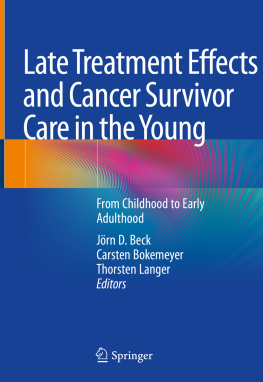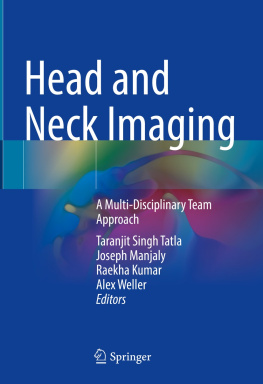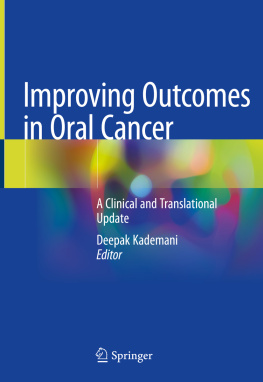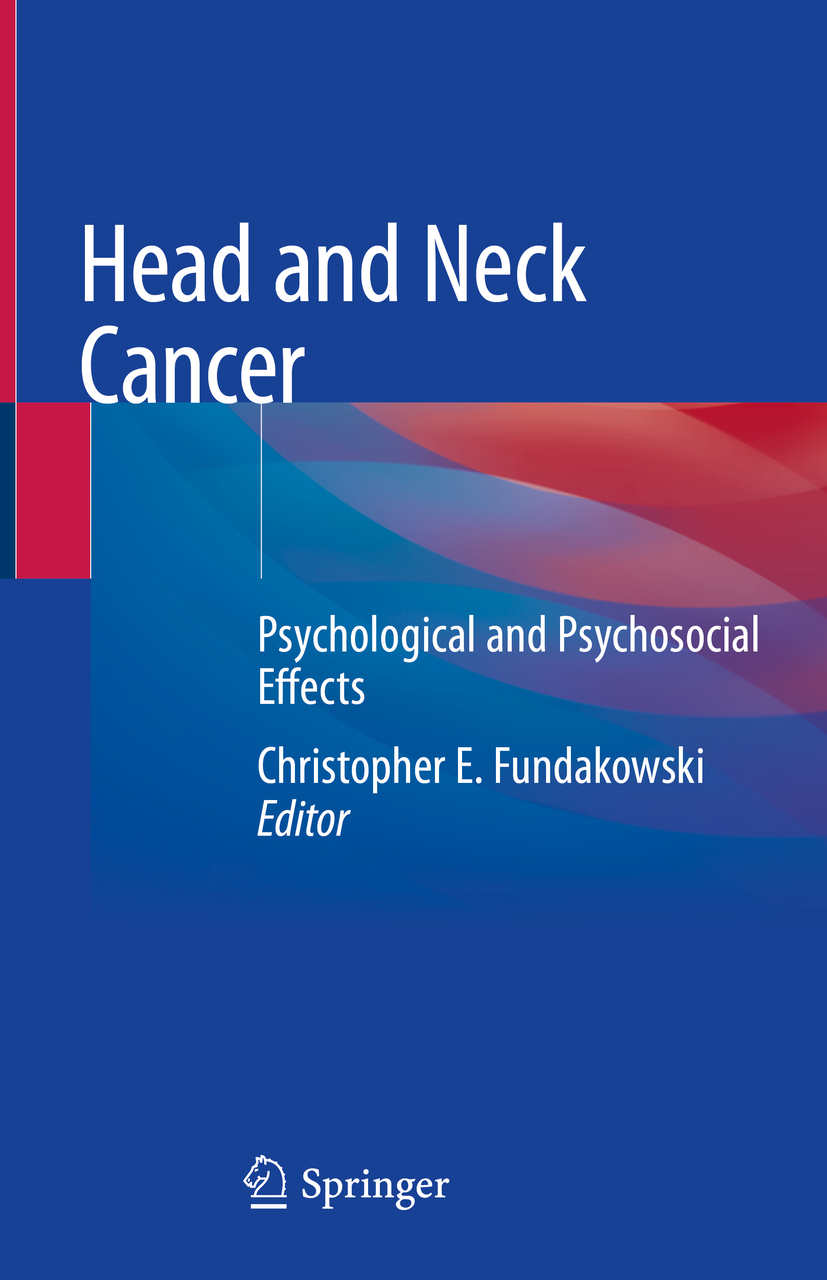Editor
Christopher E. Fundakowski
Head and Neck Cancer
Psychological and Psychosocial Effects
Editor
Christopher E. Fundakowski
Department of Otolaryngology, Thomas Jefferson University, Philadelphia, PA, USA
ISBN 978-3-030-27880-9 e-ISBN 978-3-030-27881-6
https://doi.org/10.1007/978-3-030-27881-6
Springer Nature Switzerland AG 2020
This work is subject to copyright. All rights are reserved by the Publisher, whether the whole or part of the material is concerned, specifically the rights of translation, reprinting, reuse of illustrations, recitation, broadcasting, reproduction on microfilms or in any other physical way, and transmission or information storage and retrieval, electronic adaptation, computer software, or by similar or dissimilar methodology now known or hereafter developed.
The use of general descriptive names, registered names, trademarks, service marks, etc. in this publication does not imply, even in the absence of a specific statement, that such names are exempt from the relevant protective laws and regulations and therefore free for general use.
The publisher, the authors and the editors are safe to assume that the advice and information in this book are believed to be true and accurate at the date of publication. Neither the publisher nor the authors or the editors give a warranty, expressed or implied, with respect to the material contained herein or for any errors or omissions that may have been made. The publisher remains neutral with regard to jurisdictional claims in published maps and institutional affiliations.
This Springer imprint is published by the registered company Springer Nature Switzerland AG
The registered company address is: Gewerbestrasse 11, 6330 Cham, Switzerland
This text is both inspired by and dedicated to my patients.
Preface
There has been a dramatic shift in the way we talk about, approach, and treat head and neck cancer. In a world where many refer to the good old days as a thing of the past, that is not the case in head and neck cancer. The exciting times are right now as we approach cancer care in a way was unimaginable a decade ago. Radically morbid surgery is commonly the exception rather than the rule, and in many cases, the patient has no visible incision, dramatically reduced length of stay, and improved outcome. Reconstructive techniques continue to advance, and great lengths and planning are commonly undertaken by multiple teams before, during, and after surgery to tailor and optimize the function and appearance. Incredibly, free tissue transfers have become the standard of care for many surgical defects, and with the benefit of highly experienced teams, the days of cases running into the early morning hours are few. The administration of radiation has changed where we no longer see the woody necks that we used to. Immunotherapy has and will continue to be an exciting area that may prove to completely change the way we approach and think about cancer treatment.
While we commonly focus on survival as a major endpoint in cancer care, it is easy to sidestep the dramatic psychological and psychosocial impact that this diagnosis carries. Patient outcomes are much broader than survival. These are commonly complicated issues that take a great deal of time to tease out in a busy clinical setting, surgeons/oncologists commonly lack focused training in these areas, and successful interventions and management of these issues are difficult. Building teams which contain individuals with the appropriate expertise, experience, and availability for these patients is critical.
I have been fortunate to work with many talented head and neck cancer providers given the multidisciplinary nature of our field and am grateful for their input, contributions, and expertise which have made this text possible. The goal of this project was to examine in detail the many areas of impact for the patient who is traveling through the diagnosis and treatment of a head and neck cancer. The reader will be able to explore many of these issues in depth, such as the trends in diagnosis of head and neck cancer, advances and outcomes associated with minimally invasive surgery, long-term quality of life and functional outcomes, issues related to cancer pain, importance and impact of nutrition, how reconstructive advances affect functional outcomes, the impact of cancer recurrence, and financial consequences of cancer diagnosis and treatment.
Fortunately, I would say that our field as a whole understands the importance of these issues and invariably wants nothing but the best for our patients. It is our job now to develop workflows, resources, and a clinical environment that both integrates and places value on all of these facets, knowing that, ultimately, it will impact patient outcomes.
Christopher E. Fundakowski
Philadelphia, PA, USA
Acknowledgments
I would like to thank my wife, Aimee, who somehow has remained supportive and tolerant of my career while being an unbelievable mother and wife and full-time healthcare professional. I also owe the foundation and trajectory of my career to my other two families, Miami and Nashville. I am fortunate to have so many gifted clinicians who take part in this project. Thank you again for your time and efforts.
Contents
Elizabeth Cottrill , Erin Reilly and Orly Coblens
Ameya A. Jategaonkar , Arvind K. Badhey and Raymond L. Chai
Steven M. Sperry and Nitin A. Pagedar
Christine Mei and Zoukaa Sargi
Charissa Kahue , Nolan Bruce Seim and Kyle Mannion
Barbara Ebersole and Kathleen Moran
Leah Novinger , Lina Nieto and Avinash V. Mantravadi
Aurora Mirabile
Nikhita Jain
Evan M. Graboyes , Avigeet Gupta and Katherine R. Sterba
Marianne Abouyared , Alizabeth Weber and Jeffrey J. Houlton
Yoseph A. Kram and Eric D. Wirtz
Jennifer Jacobs
Christopher E. Fundakowski
Contributors
Marianne Abouyared MD
Department of Otolaryngology, University of California Davis, Sacramento, CA, USA
Arvind K. Badhey MD
Department of Otolaryngology- Head and Neck Surgery, Icahn School of Medicine at Mount Sinai, New York, NY, USA
Raymond L. Chai MD
Department of Otolaryngology- Head and Neck Surgery, Icahn School of Medicine at Mount Sinai, New York, NY, USA
Orly Coblens MD
Head and Neck Surgery, University of Texas Medical Branch, League City, TX, USA
Elizabeth Cottrill MD
Department of Otolaryngology Head & Neck Surgery, Thomas Jefferson University Hospital, Philadelphia, PA, USA
Barbara Ebersole BFA, MA, CCC-SLP
Department of Surgical Oncology, Division of Head and Neck Surgery, Fox Chase Cancer Center, Philadelphia, PA, USA
Christopher E. Fundakowski MD
Department of Otolaryngology, Thomas Jefferson University, Philadelphia, PA, USA
Evan M. Graboyes MD
Department of Otolaryngology-Head & Neck Surgery, Medical University of South Carolina, Charleston, SC, USA
Avigeet Gupta BS
Department of Otolaryngology-Head & Neck Surgery, Medical University of South Carolina, Charleston, SC, USA

